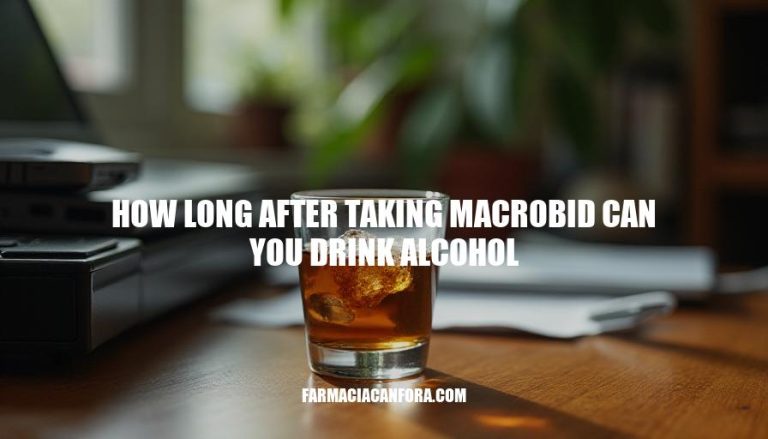


Macrobid, also known as nitrofurantoin, is an antibiotic commonly prescribed to treat urinary tract infections (UTIs). A frequently asked question by individuals taking Macrobid is how long they need to wait after finishing the medication before they can consume alcohol. This question is relevant because alcohol consumption can potentially irritate the bladder and urinary tract, which are already sensitive due to the infection.
Additionally, alcohol may exacerbate side effects such as nausea, dizziness, and drowsiness, which are common with Macrobid. Understanding the appropriate timing and precautions for alcohol consumption while on Macrobid is important for ensuring effective treatment and minimizing discomfort.
Macrobid, also known by its generic name nitrofurantoin, is an antibiotic used to treat bacterial infections. It is commonly prescribed for urinary tract infections (UTIs). Macrobid works by inhibiting the growth and reproduction of bacteria, making it effective in treating infections caused by Escherichia coli or Staphylococcus saprophyticus.
It is available in tablet and liquid forms and is typically taken with food.
Combining alcohol and antibiotics can lead to adverse interactions. Certain antibiotics, such as metronidazole, tinidazole, cefoperazone, cefotetan, and ketoconazole, can cause severe side effects when taken with alcohol. These side effects include nausea, vomiting, flushing, headache, rapid heartbeat, and stomach cramps.
Other antibiotics, like isoniazid and linezolid, can cause liver damage and high blood pressure when mixed with alcohol.
Even antibiotics like doxycycline and erythromycin may become less effective when alcohol is consumed.
It’s crucial to avoid alcohol while taking these medications to prevent these potentially dangerous reactions. Always check the warning label on your antibiotic and consult your doctor or pharmacist if you’re unsure about alcohol consumption while on medication.
Macrobid (nitrofurantoin) does not have a direct interaction with alcohol, but it is generally advisable to avoid alcohol while taking this medication. Alcohol can place an additional burden on the liver, which is already working to metabolize the medication. This can increase the risk of liver damage and impair liver function.
Additionally, alcohol can intensify certain side effects of Macrobid, such as dizziness, drowsiness, and nausea.
Consuming alcohol while taking Macrobid can also reduce the effectiveness of the medication in treating urinary tract infections (UTIs). Alcohol can interfere with the medication’s efficacy, potentially making it less potent in fighting the infection. Moreover, alcohol can irritate the bladder and urinary tract, which can exacerbate symptoms of a UTI.
In summary, to ensure the optimal effectiveness of Macrobid and to minimize the risk of side effects and potential liver damage, it is recommended to avoid alcohol consumption while taking this medication.
There is no specific waiting period mentioned in medical guidelines for consuming alcohol after taking Macrobid (nitrofurantoin). However, it is generally recommended to avoid alcohol while taking Macrobid and for at least 48 hours after completing the course of treatment. This is because alcohol can interfere with the body’s ability to metabolize the drug, potentially reducing its efficacy and increasing the risk of side effects such as dizziness, nausea, and liver strain.
Healthcare professionals often advise against drinking alcohol while on Macrobid to prevent potential complications and ensure the medication’s effectiveness.
It is always best to consult with a healthcare provider for personalized advice based on individual health conditions and circumstances.
Drinking alcohol too soon after taking Macrobid (nitrofurantoin) can lead to several potential health risks:
Increased Side Effects: Alcohol can intensify side effects such as nausea, vomiting, dizziness, and diarrhea.
Liver Burden: Both Macrobid and alcohol are metabolized by the liver. Consuming alcohol can place an additional burden on the liver, potentially leading to liver damage or impaired liver function.
Reduced Effectiveness: Alcohol may interfere with the effectiveness of Macrobid, making it harder to treat the urinary tract infection (UTI) effectively.
Bladder Irritation: Alcohol can irritate the bladder and worsen UTI symptoms.
Dehydration: Alcohol can cause dehydration, which can exacerbate UTI symptoms and hinder recovery.
Accidents and Injuries: The combination of alcohol and Macrobid can increase drowsiness and dizziness, raising the risk of accidents or injuries.
It is crucial to follow medical advice and avoid alcohol consumption while taking Macrobid to ensure the medication works effectively and to minimize the risk of adverse effects.
The article does not provide a specific waiting period for consuming alcohol after taking Macrobid, but it is generally recommended to avoid alcohol while taking the medication and for at least 48 hours after completing the course of treatment.
It is crucial to follow medical advice and avoid alcohol consumption while taking Macrobid to ensure the medication works effectively and to minimize the risk of adverse effects such as: